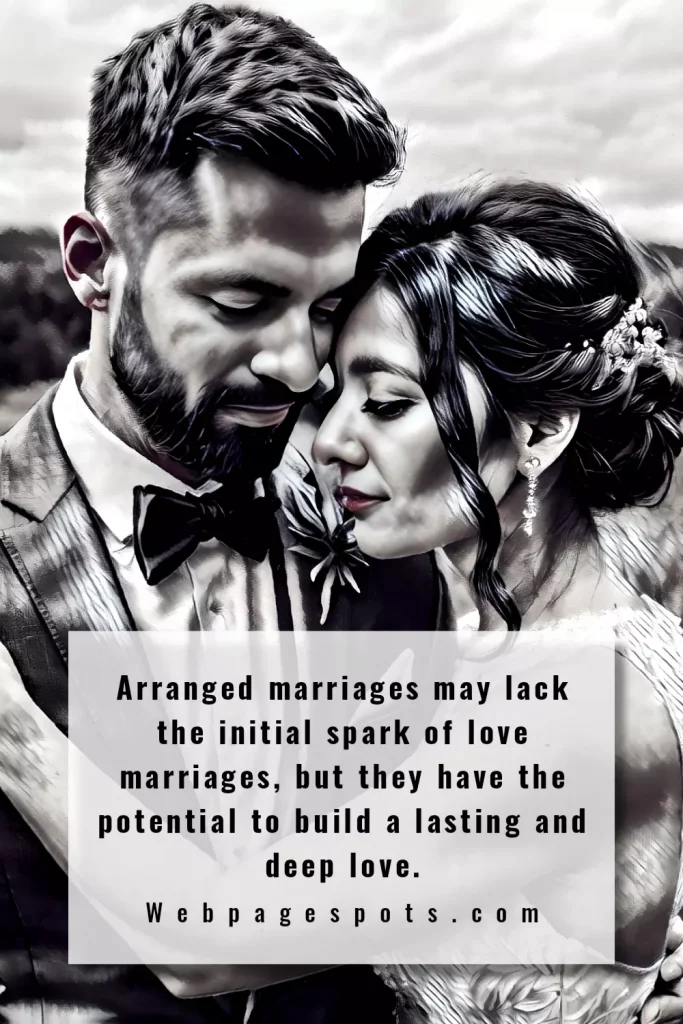Arranged vs. love marriages: 9 pros and cons for success!
This blog post may contain affiliate links. If we find a product or service to be useful, we encourage you to visit the website via that link. If you make a purchase through our referral link, we may receive a commission. Rest assured, you will not be charged any additional fees. By using these links, you can support us while making your purchase. For more information visit here.
Arranged vs. love marriages: Introduction
With a rich cultural heritage, arranged marriages have captured the fascination of many throughout history. While often misunderstood by Western cultures, they continue to be prevalent in various regions worldwide. This article delves into the intricacies of arranged and love marriages, a traditional and modern practice that peaks curiosity and sparks divisive debates.
Marriage is when two people make a deep promise to share their lives, take on duties, and do what they need to do as partners. They believe that building a family is all about making a stout base where love, friendship, and shared goals can grow.
There are two different ways to get married: love marriage and arranged marriage. In a love marriage, you marry the person you fall in love with. In an arranged marriage, individuals search through various sources to find a suitable match who fulfills their needs and desires. There are pros and cons to both types of marriage, which is the major topic of this post.
Arranged vs. love marriages: A glimpse
While love marriages thrive through mutual understanding and the potential for love, arranged marriages do not always ensure compatibility.
In a love marriage, both people make all the decisions and stand up for themselves when there are disagreements. In arranged marriages, families come together to cultivate a precious bond with the invaluable wisdom and guidance of the elder generation. They ensure the utmost happiness for all parties involved.
But when people marry for love, they often leave their families to live on their own. They take decisions without the direction or advice of the elders in the house.
In arranged marriages, family members help the couple by sharing their experiences and making ideas. But many religious groups dislike love marriages because they view them as status symbols and a means of violating family respect.
Arranged marriages occur when family members come to an agreement. This keeps relationships strong without going against what adults want or need.
For both love marriages and arranged marriages to work, there needs to be shared understanding, teamwork, and good will. For family life to go well and stay peaceful, both sides need to be involved. Fulfilling these conditions can lead to the ultimate success of both types of weddings.
Love marriages might encounter hurdles regarding societal approval, whereas arranged marriages may give rise to concerns about compatibility and personal independence.
Let’s move ahead to the detailed pros and cons of both types of weddings.
A Match Made in Tradition: Unveiling the 9 Advantages of Arranged Marriages
Arranged marriages, an age-old practice deeply rooted in many cultures around the world, have stood the test of time. While modern society frequently links love and marriage to personal freedom, it is worth delving into the various benefits that arranged unions offer. This section explores nine specific benefits that show how arranged marriages can cultivate lasting relationships and enhance personal happiness.
1. A strong family support system
The beauty of arranged marriages lies in their ability to foster a sturdy foundation, fostering a closely-knit support network between both families involved. By involving parents in the early stages, couples can tap into a wealth of guidance and wisdom passed down through generations. This invaluable insight empowers them to navigate obstacles and forge enduring, strong marriages.
2. Compatibility Beyond Cultural Factors
Unlike love-based marriages that solely focus on emotional compatibility, arranged marriages take into consideration various aspects. These aspects are social status, education level, financial stability, cultural backgrounds, and shared values within families. Taking this comprehensive approach enhances the chances of finding compatible matches that go beyond fleeting emotions. This method also considers the practical factors necessary to establish a harmonious life partnership.
3. Removing an excessive emotional burden
We can view the practice of arranged marriages in traditional societies as a pragmatic solution to the pervasive issue of high divorce rates in Western nations. These marriages allow couples to avoid the challenges caused by romantic despair or implacable differences. Arranged marriages get around these problems by ensuring that both people in the marriage have few personal issues and realistic expectations.
4. Lower divorce rates
Viewing lifelong commitment as a fundamental principle rather than an optional aspect enhances the resilience of a marriage during difficult times. This approach encourages a healthier environment for effectively resolving conflicts without immediately resorting to separation or divorce.
5. Partnerships that foster collective efforts towards environmental sustainability
Arranged unions outline a more stable framework for family structures by bringing together couples who share similar values in areas such as parenting, finances, education, religion, and career goals. Aligning these aspects from the start helps couples create supportive environments that foster family growth and well-being.
6. Increased marital satisfaction
Building trust amongst families during the pre-marriage process lays a stable foundation for harmony within the relationship itself. The mutual understanding between the partners cultivates deep respect for each other’s roles and responsibilities. As a result, both individuals experience an enhanced sense of marital fulfillment as they embark on the various stages of life, receiving unwavering support from their respective parents.
7. Preservation of cultural heritage
Arranged marriages often preserve cultural traditions by uniting individuals with shared cultural or religious backgrounds. This is crucial in our diverse society to help safeguard customs that are otherwise fading away. Besides, arranged marriages foster a sense of identity and belonging in successive generations.
8. Shared experience enhances romance.
Contrary to what many people believe, arranged marriage does not dismiss love or romance. Rather than seeking instant connection, it values the gradual nurturing of deep affection between partners as time unfolds. As couples embark on their shared journey through life’s various experiences, the intimate memories they create together naturally strengthen the unbreakable bond that true love thrives on.
9. Professional network expansion
In today’s interconnected world, where establishing professional connections is essential across all industries, arranged marriages can present captivating opportunities for expanding one’s network. By marrying into extended families, individuals can gain valuable kinship for a diverse range of job opportunities and business ventures. It has the potential to boost their personal careers significantly.
We have covered the benefits of arranged marriages in this part.
Arranged marriages offer distinct advantages not commonly associated with modern love-based matrimonial choices. These marriages foster strong familial support systems intertwined with values that encompass more than just romance. It extends the compatibility and preservation of cultural heritage.
Through its deep-rooted presence in various cultures around the world, this timeless institution plays a vital role in fostering enduring happiness and creating harmonious relationships that span lifetimes. With kinship at its core, it imbues lives with profound purpose.

Unveiling the Veiled Disadvantages of Arranged Marriages
Arranged marriages, a practice deeply ingrained in many cultures worldwide, have sparked diverse opinions and controversies. Although there are those who defend arranged marriages by claiming that they cultivate deep family connections and guarantee compatibility, it is crucial to recognize the drawbacks that come with this long-standing tradition. This section aims to shed light on nine significant drawbacks of arranged marriages, highlighting their impact on the individuals involved.
1. Limited personal choices
One of the most obvious flaws in an arranged marriage lies in the limited personal means. Individuals often find themselves bound by familial expectations and societal norms rather than following their hearts’ desires. The absence of personal exploration can hinder self-discovery and lead to lingering regrets later in life.
2. Emotional disconnect
If partners do not have sufficient understanding or emotional connection prior to marriage, it poses a potential danger of lacking compatibility or shared values after getting married. Building affection and intimacy may take time for strangers thrust into matrimony without knowing each other’s true selves.
3. Communication challenges
Healthy relationships heavily rely on effective communication skills learned through gradual mutual understanding and sharing experiences. Couples who have little time to familiarize themselves before the significant day might find it challenging to navigate through arranged marriages. The reason is that there may not be sufficient time for them to meet and build an attachment prior to their meeting.
4. Financial disputes
In arranged marriages, financial stability often takes precedence over true love. This is because families seek to safeguard their fortunes by making strategic alliances that prioritize future wealth over emotional fulfillment. This can cause potential conflicts arising from the allocation of resources throughout the married life.
5. Lack of a trust-building phase
Getting married to someone you barely know deprives spouses of crucial milestones like the courtship and dating stages. As a result, spouses gradually establish trust in a natural and organic manner. Marrying without prior bonding can present challenges in building trust within the relationship. This may lead to potential issues in the future, as suspicions and doubts may take root.
6. Incompatible personalities
People will probably experience incompatibility issues if they pair up without considering important factors like personality traits, values, and aspirations. In an arranged marriage, uncovering compatibility can often become a daunting obstacle, leading to potential dissatisfaction that may linger for a lifetime.
7. Pressure from family and society
In arranged marriages, societal expectations about ideal partners and desirable traits can create pressure on individuals. This external influence may squeeze out personal desires while emphasizing the significance of maintaining traditional norms.
8. Limited room for growth
Constrictive norms and traditions within arranged marriages often limit individuals’ opportunities for personal growth and development. Confinement within the boundaries of immediate family and cultural norms can limit individuals’ ability to pursue their passions independently.
9. Intense challenges in escaping abusive relationships
Victims of abuse in arranged marriages often face difficulties getting help. It is because family obligations and societal expectations prioritize unity over individual well-being, leaving them trapped in prolonged suffering.
While acknowledging some positive aspects that supporters attribute to it, this section has delved into the disadvantages surrounding arranged marriages.
Openly discussing these concerns and considering alternatives, such as love matches or modern matchmaking, that respect cultural traditions while promoting freedom of choice is of utmost importance. Ultimately, it is essential that any marital union prioritize mutual respect, consent, emotional connection, and personal fulfillment above all else.
Now let’s move towards love marriage—pros and cons.
Exploring the Endless Magic of Love Marriages: 9 Advantages
Love is a powerful and transformative energy that defies limits and stirs profound feelings within us. When two individuals choose to come together in matrimony fueled by love, it sets the stage for a unique bond that we commonly refer to as ‘love marriages.’ Partners forge love marriages with a deep connection to mutual love and an emotional bond (not dependent on familial consent), which sets them apart from arranged marriages. In this section, we will delve into nine advantages that make love marriages truly magical.
1. Genuine emotional connection
One of the most significant advantages of a love marriage lies in its foundation—an authentic emotional connection between two people deeply in love. This empowers both partners with the understanding, empathy, and support necessary for lifelong companionship.
2. Compatibility Triumphs
In the realm of love marriages, compatibility takes center stage. Since individuals choose each other based on shared interests, values, beliefs, and goals, they naturally complement each other’s strengths while respectably accepting differences.
3. Self-Discovery
Embarking on a love marriage often leads to self-discovery as couples learn more about themselves through their partner’s eyes. By embracing personal growth together within this nurturing environment defined by trust and loyalty, spouses have ample room for introspection.
4. Enhanced Communication Skills
In a love marriage, effective communication skills are essential for cultivating thriving relationships. Couples in this type of union truly excel in this domain. Their open and heartfelt conversations are the reason behind this, filled with warmth and enthusiasm for each other’s ideas and concerns.
5. Increased Feelings of Independence
Love marriages often promote independence among partners who choose to marry based on personal preferences rather than strictly adhering to societal norms or meeting parental expectations. Why not? This fosters fulfillment on both individual and marital fronts.
6. Anchored Intimacy
In love marriages, genuine affectionate connections naturally give rise to intimacy. This enables partners to explore profound depths of tenderness and passion.
7. Strong Support System
Love’s powerful forces bind couples, transforming them into lifelong allies and confidants. As a result, they create a steadfast support system where they collaborate to uplift, guide, inspire, and protect one another in the face of life’s challenges and difficulties.
8. Nurturing Family Bonds
Families often experience stronger bonds within love marriages as they genuinely accept and understand each other. Over time, these relationships grow into harmonious collaborations that extend far beyond just the couple themselves.
9. Increased longevity
Research has shown that love marriages achieve higher rates of success than arranged marriages. This is because deep feelings of emotional closeness and compatibility may serve as the bedrock of long-lasting love marriages. (We will further delve into this topic in the following sections of this article.)
Couples who commit themselves fully to their relationship from the very beginning are better equipped to navigate the trials of life together. This sturdy foundation paves the way for a fulfilling and enduring partnership overflowing with happiness and satisfaction.

Undoubtedly, selecting a life partner out of love is a momentous stride towards eternal bliss and satisfaction. Yet, it is crucial to recognize that every marriage, regardless of its type, comes with distinctive challenges and drawbacks.
Genuine companionship, founded on reciprocal respect, empathy, and trust, truly counts in the end. Experience the incredible rewards it brings: an unparalleled and everlasting bond like no other!
9 Disadvantages of Love Marriages: Stepping into the Complex Realm of Emotional Bonds
Love, though celebrated and sought after universally, can pose its fair share of challenges within the realm of marriage. While we often see love marriages as a symbol of freedom and personal choices, it is crucial for couples to navigate through the distinctive challenges that come their way with the utmost care. In this section, we will explore nine potential drawbacks faced by those who opt for love marriages.
1. Cultural Clash
Love marriages often face a significant disadvantage due to the clash between different cultural backgrounds. When individuals from diverse upbringings unite in matrimony, their dissimilar traditions, beliefs, and values can create tensions within families or between partners themselves.
2. Family Resistance
Love marriages sometimes face opposition from conservative families who firmly adhere to traditional norms and expect arranged marriages. Family members can exert overwhelming pressure, strain relationships, or even lead to separation if a couple can’t reach a compromise.
3. Romanticized Expectations
In love marriages, there may exist idealistic expectations derived from popular culture’s depiction of romance. Entering a relationship based solely on emotions without considering long-term compatibility factors, such as financial stability or shared goals, can cause unforeseen difficulties.
4. Financial Instability
Many couples who embark on love marriages initially overlook the crucial aspect of securing financial security and become solely engrossed in passionate emotions. Ignoring this aspect of financial security can give rise to many other problems.
5. Unrealistic Assumptions about Love
Perhaps one disadvantage lurking behind the veil of romantic sentimentality lies in unrealistic assumptions about everlasting passion. Deep affection ignites the flame of passion in a relationship during the courtship period. But gradually, it diminishes as the harsh reality of life takes its toll.
6. Trust Issues
One of the most crucial factors in any partnership is trust. However, for couples who marry for love, it’s common for distrust to arise more often. This is because our pre-marital experiences shape our perceptions and expectations, leading to lingering doubts.
7. Social Judgment
Societal prejudice can cast a shadow on loving marriages. Conservative communities, where traditional norms are highly valued over personal choices, particularly exemplify this. The constant judgment from society can lead to feelings of isolation or guilt within the relationship.
8. Lack of Support Systems
Couples who opt for love marriages may often find themselves isolated from family support during testing times, as they choose a path perceived as unconventional.
9. Emotional Rollercoaster Ride
Intense emotions fuel love marriages, creating an emotional rollercoaster effect throughout the journey. These dramatic fluctuations in emotions related to passionate love might lead couples through phases of happiness, jealousy, and affinity. This might also cause heartache at different stages of their relationship.

While love marriages offer immense freedom and the opportunity to choose life partners based on affectionate bonds rather than societal standards alone, we can’t ignore their fair share of disadvantages. For a partnership to thrive, it is crucial to evaluate compatibility factors, such as cultural diversity, financial stability, trust-building, and realistic long-term commitment.
Arranged vs. love marriages: Exploring Success Rates
The decision between an arranged marriage and a love marriage is one that has perplexed individuals throughout history. While both types of unions have their own merits, it is worthwhile to examine the success rates of these two distinct paths towards matrimony.
In this section, we will delve into the concept of success within marriages and explore how arranged marriages fare against love marriages in terms of:
- long-term stability,
- emotional well-being,
- personal growth.
Understanding Success in Marriage
Before delving into the specifics of arranged versus love marriages’ success rates, it is crucial to comprehend what makes a successful union. The definition varies between different cultures and individuals. Yet, universally recognized indicators include marital harmony resulting from mutual respect, support, trust, communication skills, compatibility values, or lifestyle choices shared by partners.
Success Rate: Long-Term Stability
One notable aspect commonly associated with arranged marriages revolves around longevity and endurance. Many argue that arranged marriages have a higher likelihood of lasting, attributing this to external factors such as familial pressures or social expectations. These influences pressure the couple’s commitment to sustaining the bond through various challenges.
Arranged marriages emphasize collective interests over individual preferences when selecting life partners. This careful selection process not only considers physical allure, but also includes character traits compatible with social standards or family background. The aim is to ensure compatibility at multiple levels, including cultural practices or financial matters.
In contrast, love marriages thrive on passionate emotions. It is where couples choose each other based primarily on affectionate feelings rather than calculated assessments. Disagreements arising from contrasting values or expectations can sometimes test these powerful bonds initially fueled by romance. This can impede long-term stability if unresolved effectively.
Statistical data doesn’t show one type of marriage consistently being better for longevity. The success of any marriage relies on both partners being willing to invest time and effort in nurturing their bond, regardless of its origin.
Success Rate: Emotional Well-being
Emotional well-being is an essential aspect contributing to the overall satisfaction of a marital relationship. It encompasses psychological contentment and mental health that impact a couple’s ability to weather various life challenges together successfully.
Arranged marriages often cultivate companionship based on shared familial values, compatibility metrics measured during matchmaking processes (educational background, religious beliefs), or social status considerations. This foundation fosters secure emotional support systems where couples prioritize collective goals over individual desires, leading to harmonious coexistence.
Conversely, love marriages thrive on passion-driven emotions with partners united by strong personal connections. Partners in love marriages ground their unions in mutual understanding and implicitly acknowledge each other’s wants.
While such relationships benefit from initial intense attraction, fostering great emotional rewards early on, they may face struggles if difficulties arise. Difficulties in the sense of different perspectives or when faced with unexpected obstacles in their shared life journey.
Again, researching specific data and comparing emotional well-being only based on one type against another proves challenging. It varies significantly among individuals. Individual differences play a significant role, regardless of societal norms or cultural influences related to marriage types.
Success Rate: Personal Growth
Last but not least is personal growth, an important aspect for evaluating marriage success rates across varied contexts. Arranged marriages offer opportunities for personal growth as couples navigate new family dynamics. This occurs when individuals adhere to traditional societal roles and actively engage in various collective social events throughout their married lives.
In contrast, love marriages provide more freedom for self-expression and authenticity in relationships. Choices are based on personal affection rather than external influences, allowing for individual exploration and joint adventures. Partners play a crucial role in fostering creative expression, nurturing individuality, and supporting personal growth beyond the boundaries of the relationship. This fosters synergy that leads to fulfilling futures and measures happiness.
Conclusion
Proving beyond a doubt whether arranged marriages are superior to love marriages, or vice versa, is an unattainable goal. The success of these unions is inherently subjective, as it relies on the distinct experiences and cultural influences of each person involved.
The pros and cons of arranged vs. love marriages are infinite and subjective, with each side presenting its own set of circumstances. Love marriages harness the power of spontaneity and personal choices, serving as a testament to the resilience of emotions. But arranged marriages traditionally depend on the backing and endorsement of families, which presents a striking contrast.
The chances of success in a relationship are significantly higher when married partners actively strive to understand and provide support for one another. Ultimately, the manner in which a couple marries holds less significance compared to the relentless love, unwavering commitment, and diligent effort invested by both partners.
As cultural standards shift, our perceptions of what defines a good marriage also transform. They emphasize the significance of embracing diversity in different paths to matrimony, whether it’s love or arranged marriage. Thanks for reading about arranged vs. love marriages.
Understanding the importance of copyright law is absolutely vital, as it strictly prohibits any reproduction or replication of works without the explicit permission of the author. Any unauthorized duplication of content will lead to legal action for copyright infringement under Section 14 of the Copyright Act.












